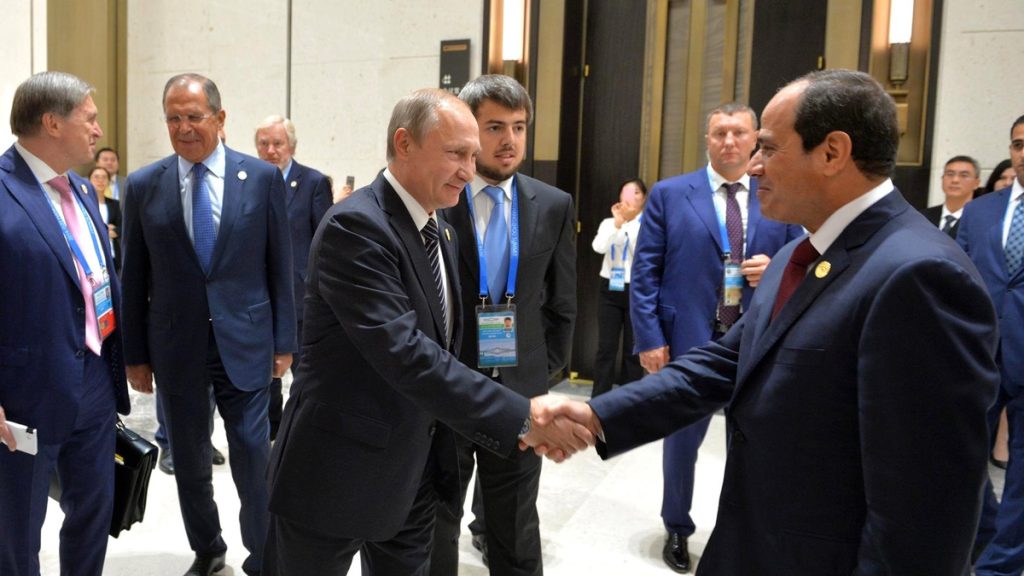For Egypt, Russia has traditionally been one of the major suppliers of wheat and weapons. Now that the Russian Federation is bogged down in Ukraine, it is Moscow that desperately needs Cairo’s military assistance. But will the North African nation risk jeopardizing its relations with the United States by supplying Russia with rockets, or will it maybe sell some of its ammunition to Kiev?
According to a leaked US intelligence document, Egyptian President Abel Fattah El-Sisi planned to provide the Kremlin with 40,000 rockets. Egypt, however, denied such claims. Moreover, after talks with United States officials, Cairo has reportedly agreed to supply ammunition to Ukraine.
From Egypt’s perspective, the ideal case scenario would be to arm both sides in the conflict that is unlikely to end anytime soon. But at this point it remains highly uncertain if the North African nation will get the green light from Washington to pursue such a lucrative policy.
In March, Egypt has reportedly approved selling 152mm and 155mm artillery rounds to the United States for transfer to Ukraine. In exchange, Cairo is expected to sign a long-term military aid deal with Washington, and purchase F-35 stealth fighter jets and Patriot air defense systems from the US. Last year, under American pressure, Egypt had to give up its ambitions to buy Su-35S jets from Russia. The Egyptian army already has a significant number of Russian-made MiG-29M fighters and Ka-52 helicopters, and in 2019 – when the deal on Su-35S jets was reached – Cairo was hoping to expand its military ties with Russia. But as a result of US pressure, the Russian-made fighter jets have apparently ended up in Iran, while Egypt now seeks to deepen its military cooperation with Pentagon.
That, however, does not mean that Cairo is not interested in selling rockets to Russia. It is not a secret that the North African nation produces Sakr-45 rockets that are compatible with the Russian multiple rocket launcher BM-21 Grad. Even though Russian and Egyptian military officials have almost certainly negotiated rocket supplies to Moscow, it is still unclear if the two sides have reached a deal. But even if they have, that would change nothing on the ground in Ukraine. Russia is firing between 20,000 to 50,000 artillery rounds per day, which means that 40,000 rockets from Egypt would last for only a couple of days.
Meanwhile, Egypt remains one of its closest US allies in the Middle East and North Africa. The American multinational corporation Boeing has reportedly started upgrading the Egyptian AH-64D Apache attack helicopter fleet, which is part of the $2.1 billion deal between the two countries. Since 1978, the United States has provided Egypt with over $50 billion in military and $30 billion in economic assistance. Thus, if Cairo, despite the US pressure, provides Russia with rockets, Washington can respond by reducing aid to the North African state, which could have a serious impact on Egypt’s economy.
However, policy makers in Cairo are quite aware that economic cooperation with Russia is also very important for their country. Egypt remains the second most popular foreign destination for Russian tourists. The loss of tourist flow from Russia in the future could lead to a deterioration in the financial situation in Egypt. Also, the North African nation is dependent on Russian wheat. In 2010, after drought devastated Russia’s wheat crop, Moscow imposed a wheat export ban to secure domestic supplies. The move may have indirectly contributed to the Arab Spring uprisings in the Middle East. Wheat prices rose globally, and Egypt, as Russia’s biggest grain consumer, felt the consequences firsthand as protestors demanded a halt to rising bread prices.
Thus, unless seriously pressured by the US, Cairo has no reason not to sell a relatively small batch of rockets to Russia, especially if it soon begins arming Ukraine. Meanwhile, El-Sisi will undoubtedly continue to portray Egypt as a neutral actor in the Russian-Ukrainian war. Quite aware of the difficult economic situation at home, he likely aims to preserve good ties with Moscow, especially in the field of energy, given that the Russian state atomic energy corporation Rosatom has begun construction of Egypt’s first nuclear power plan in July 2022.
The Kremlin, for its part, is expected to turn a blind eye to potential Egyptian arm sales to Ukraine, just like it continues ignoring Turkey’s weapon supplies to the Eastern European country. For policy makers in Moscow, the interests of various Russian oligarchic groups, as well as energy giants such as Rosatom, Gazprom, and Lukoil, seem to have a priority over the outcome of the war in Ukraine.
Therefore, it is the United States, rather than Moscow and Cairo, that will almost certainly have the last say in the Egyptian weapons sales to Russia and Ukraine.
